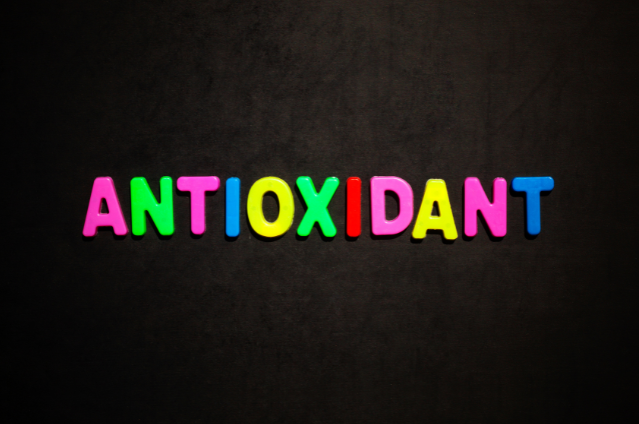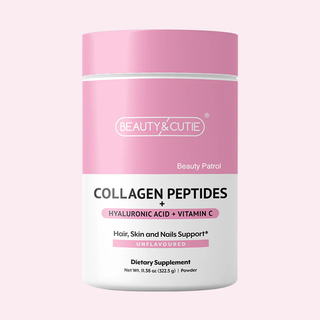Antioxidants have become a buzzword in the beauty industry and for good reason. These powerful compounds play a crucial role in our overall health, including our skin health. But what exactly do antioxidants do for our skin? If you're looking to understand the benefits of antioxidants for your skin and how they can enhance your beauty routine, then keep reading. In this article, we'll explore the science behind antioxidants and their impact on our skin.
What Is An Antioxidant?
Antioxidants are compounds found in many foods, especially fruits, and vegetables, that can help prevent or slow damage to cells caused by free radicals, unstable molecules that can harm cells. When free radicals accumulate, they can lead to oxidative stress, which has been linked to aging, cancer, heart disease, and other health problems.
Antioxidants can neutralize free radicals, reducing oxidative stress and protecting cells from damage. In the context of skin health, antioxidants can help protect against sun damage, reduce inflammation, and improve overall skin tone and texture.
How Do Antioxidants Help Improve The Appearance Of Skin?
Antioxidants play a crucial role in improving the appearance of skin. They neutralize free radicals, which are harmful molecules that can damage our skin cells, causing premature aging, wrinkles, and even skin cancer. Antioxidants protect against this damage by preventing the formation of free radicals and by repairing the damage already done.
Antioxidants like vitamins C and E, beta-carotene, and selenium are especially beneficial for skin health. Vitamin C promotes collagen production, which keeps skin firm and elastic.
It can also have a brightening effect on skin tone and reduces the appearance of dark spots. Vitamin E helps nourish and protect the skin while reducing inflammation and improving the skin's moisture retention.
Beta-carotene, found in fruits and vegetables, converts to vitamin A in the body, which promotes healthy skin cell growth and helps repair damaged cells. Selenium, found in nuts, fish, and whole grains, can improve skin elasticity and reduce inflammation.
What Are Some Of The Best Sources Of Antioxidants For Skin?
There are several foods that are great sources of antioxidants for the skin. Some of the best sources of antioxidants are:
- Berries - blueberries, strawberries, and blackberries are high in antioxidants that can help protect the skin from damage caused by free radicals.
- Dark Chocolate - contains flavanols that can improve skin hydration, thickness, and elasticity.
- Green Tea - contains catechins that can reduce inflammation and protect against sun damage.
- Nuts - almonds, and walnuts contain vitamin E, which can help with moisturizing, nourishing, and protecting the skin.
- Fatty Fish - salmon, mackerel, and sardines contain omega-3 fatty acids, which can reduce inflammation and improve skin hydration.
- Sweet Potatoes - contain beta-carotene, which can promote healthy skin cell growth and repair damaged cells.
- Tomatoes - contain lycopene, which can protect against sun damage and improve skin texture.
- Citrus Fruits - oranges and lemons contain vitamin C, which can promote collagen production and brighten skin tone.
Adding these foods to your diet can help improve the health and appearance of your skin. In addition, using skincare products that contain antioxidants can also provide added protection against free radicals and promote overall skin health.
Are There Any Potential Side Effects Of Using Antioxidant Skin Care Products?
While antioxidant skin care products are generally considered safe and beneficial, there are some potential side effects to be aware of. These can vary depending on the type and concentration of antioxidants used in the products, as well as the individual's skin type and sensitivity.
Some common side effects of using antioxidant skin care products may include irritation, redness, and inflammation. This can be particularly true if the product contains high concentrations of antioxidants or if the individual has sensitive skin.
In some cases, using antioxidant skin care products can also lead to increased sensitivity to sunlight, which can increase the risk of sunburn and skin damage. This is because some antioxidants can break down in the presence of UV rays, reducing their effectiveness and potentially causing damage to the skin.
It's also worth noting that some people may experience allergic reactions to certain antioxidants used in skin care products. If you experience any itching, swelling, or rash after using an antioxidant product, discontinue use immediately and consult a doctor.
In general, it's important to choose antioxidant skin care products carefully, taking into account your skin type and any potential sensitivities. Always follow the manufacturer's instructions for use, and if you experience any adverse effects, stop using the product and seek medical advice.
What Types Of Antioxidants Should Be Avoided When Selecting Skin Care Products?
When selecting skin care products, it is important to be mindful of the types of antioxidants included. While antioxidants can be highly beneficial for skin health, certain types can actually do more harm than good.
- Synthetic Antioxidants: Synthetic antioxidants, such as BHA and BHT, can be harmful to the skin and should be avoided in skin care products.
- Fragrance Antioxidants: Antioxidants used for fragrance purposes, such as limonene and geraniol, can cause skin irritation and should be avoided.
- Thickening Agent Antioxidants: Some thickening agents, such as carbomer, can contain antioxidants that may not be suitable for all skin types.
- Highly Concentrated Antioxidants: High concentrations of antioxidants, such as vitamin C and retinol, can cause irritation and sensitivity in some individuals, so it's essential to use these products with caution.
- Preservative Antioxidants: Antioxidants used as preservatives, such as parabens, can be harmful to the skin and should be avoided.
It's important to read the labels carefully when choosing skin care products to ensure that they do not contain any harmful antioxidants that could damage or irritate your skin. Opt for natural and organic products that use plant-based antioxidants and consult with a skincare professional if you have any concerns or questions.
How Often Should Antioxidant Products Be Used To Get The Best Results?
The frequency of using antioxidant products for best results varies depending on the specific product and the individual's skin type and needs. Generally, it is recommended to use antioxidant products daily as part of a consistent skincare routine to maintain optimal skin health.
Some products, such as serums and toners, can be used twice daily for maximum effectiveness. It is important to follow the instructions on the product packaging and consult with a skincare professional for personalized recommendations. Additionally, maintaining a healthy diet rich in antioxidants can also contribute to overall skin health.
Vitamin B3 and Vitamin D
Vitamin B3, also known as niacinamide, is a water-soluble vitamin that helps improve skin texture and tone. It is an excellent ingredient for those with sensitive or acne-prone skin. Vitamin B3 helps reduce inflammation and redness, which can be beneficial for those with rosacea. It also helps regulate oil production, which can reduce the appearance of pores and prevent breakouts.
Vitamin D is another essential vitamin that is crucial for skin health. It is often referred to as the "sunshine vitamin" because the body produces it when the skin is exposed to sunlight. Vitamin D helps regulate calcium and phosphate levels in the body, which are essential for healthy bones, teeth, and skin.
In Conclusion
In summary, antioxidants play a crucial role in maintaining healthy and youthful-looking skin. They help protect the skin from environmental stressors and signs of aging, such as fine lines and wrinkles while promoting overall skin health. When choosing skincare products, it's important to look for those that contain antioxidants, such as vitamins C and E, and plant-based extracts, for maximum benefits.
In addition to using antioxidant-rich skincare products, consuming a diet rich in antioxidants, such as fruits and vegetables, can further promote skin health. By incorporating antioxidants into your daily routine, you can help keep your skin looking its best and maintain a healthy, youthful glow.
Final Thoughts
Experience the ultimate beauty transformation with Beauty and Cutie’s collagen powders. Our innovative formula rejuvenates your hair, skin, and nails by delivering essential collagen peptides that support healthy cell growth. Say hello to vibrant, glowing beauty!
Sources
- https://www.healthline.com/nutrition/antioxidants-explained
- https://ods.od.nih.gov/factsheets/VitaminC-HealthProfessional
- https://www.hopkinsmedicine.org/health/wellness-and-prevention/berry-good-for-your-heart
- https://www.healthline.com/nutrition/top-10-evidence-based-health-benefits-of-green-tea
- https://www.healthline.com/nutrition/sweet-potato-benefits
- https://www.intechopen.com/chapters/81679
*These statements have not been evaluated by the Food and Drug Administration. This product is not intended to diagnose, treat, cure or prevent any diseases.


